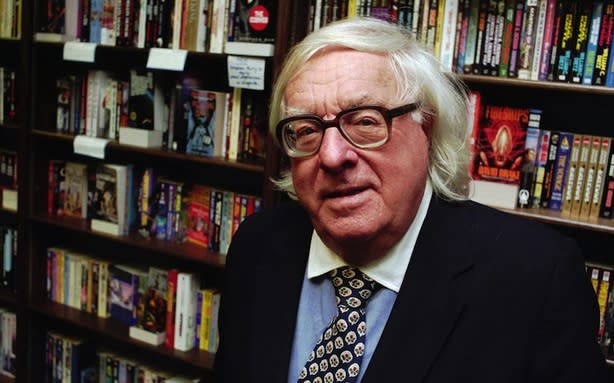Ray Bradbury, Science Fiction Master, Has Died at 91

The legendary science fiction author died in Los Angeles at the age of 91, his family and publisher have confirmed. The science fiction blog got confirmation from Bradbury's grandson and biographer that the author of such classics as Fahrenheit 451 and The Martian Chronicles (and so many more) had died Wednesday morning.
RELATED: One Foreign Journalist Killed, Three Missing in Syria
An early icon to many young readers and adults alike, Bradbury's stories introduced millions to science fiction and a general love of reading. In a lengthy and insightful interview that's worth a look in remembrance of the author, he told the Paris Review in 2010:
Science fiction is the fiction of ideas. Ideas excite me, and as soon as I get excited, the adrenaline gets going and the next thing I know I’m borrowing energy from the ideas themselves. Science fiction is any idea that occurs in the head and doesn’t exist yet, but soon will, and will change everything for everybody, and nothing will ever be the same again. As soon as you have an idea that changes some small part of the world you are writing science fiction. It is always the art of the possible, never the impossible.
Bradbury was in no way reclusive. His grandson, Danny Karapetian, called him "the biggest kid I know" in his remarks to io9. The Associated Press notes that Bradbury regularly appeared at bookstores and literary events in Los Angeles, even after a 1999 stroke put him in a wheelchair. And the author kept his website current with information about his work, his life, and his thoughts. You can hear the author speak in the myriad video clips on his site, which are unfortunately not embeddable.
RELATED: Japanese Reporters Were Targeted in Syria
There's plenty of other footage of Bradbury we can post here, though, including this CBC feature that calls him "the Louis Armstrong of fiction":
RELATED: Actor Peter Falk Dead At 83
RELATED: Neil Armstrong, First Man to Walk on the Moon, Has Died
And we think you may enjoy a reminder of Bradbury's foray into television, with HBO's Ray Bradbury Theater:
RELATED: Betty Ford, Dead at 93
Now it's time to take a look at the obituaries that are starting to come out:
The New York Times' Gerald Jonas gives some good insight into Bradbury's writing methods and his thoughts on his discipline:
Mr. Bradbury referred to himself as an “idea writer,” by which he meant something quite different from erudite or scholarly. “I have fun with ideas; I play with them,” he said. “ I’m not a serious person, and I don’t like serious people. I don’t see myself as a philosopher. That’s awfully boring.” He added, “My goal is to entertain myself and others.”
He described his method of composition as “word association,” often triggered by a favorite line of poetry.
The Associated Press's John Rogers notes Bradbury's own complicated relationship with technology and machines:
Although involved in many futuristic projects, including the New York World's Fair of 1964 and the Spaceship Earth display at Walt Disney World in Florida, Bradbury was deeply attached to the past. He refused to drive a car or fly, telling the AP that witnessing a fatal traffic accident as a child left behind a permanent fear of automobiles. In his younger years, he got around by bicycle or roller-skates.
"I'm not afraid of machines," he told Writer's Digest in 1976. "I don't think the robots are taking over. I think the men who play with toys have taken over. And if we don't take the toys out of their hands, we're fools."
Update (2:45 p.m. EDT): The White House sends this statement from president Barack Obama:
For many Americans, the news of Ray Bradbury's death immediately brought to mind images from his work, imprinted in our minds, often from a young age. His gift for storytelling reshaped our culture and expanded our world. But Ray also understood that our imaginations could be used as a tool for better understanding, a vehicle for change, and an expression of our most cherished values. There is no doubt that Ray will continue to inspire many more generations with his writing, and our thoughts and prayers are with his family and friends.
